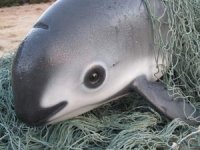
Meet the vaquita, the world’s most rare marine mammal, found only in the Gulf of California.
Sadly, there are only 30 vaquita porpoises left — in the entire world.
These tiny porpoises frequently get caught in fishing nets, and after struggling to break free, they drown. And although Mexico has already banned the nets that trap vaquitas, the high demand for shrimp from the region leads to illegal fishing that kills this already endangered animal. That’s where we come in.
Unlike species an ocean away, there’s something concrete we as Californians can do to help save these precious mammals from permanent extinction. By banning the sale of shrimp from the region in our state we can greatly reduce the demand for illegally harvested seafood leading to the deaths of these amazing animals.
The nets that trap the vaquitas have led to a 90% decline in their population since 1990. Now only 30 vaquitas are left and the survival of their species is beyond endangered. But if we don’t act soon — the vaquitas won’t have another five years.
Mexico has already banned the nets that trap vaquitas and this bill will ensure that California does its role in protecting the last 30 vaquitas on earth.
We cannot stand idly by as these precious creatures face extinction from human greed.
So please, sign your name and help save the vaquita today: http://www.ecovote.org/save-the-vaquita



